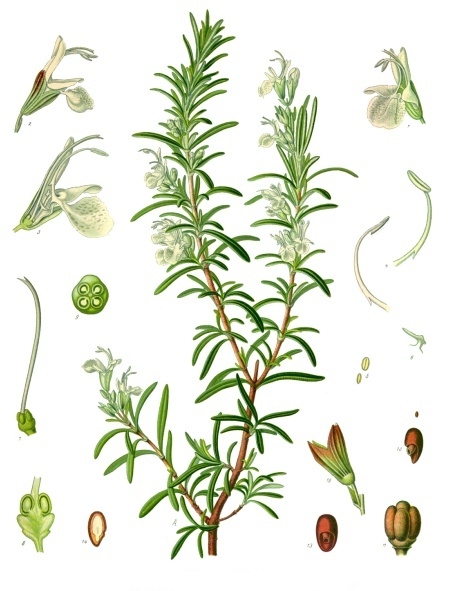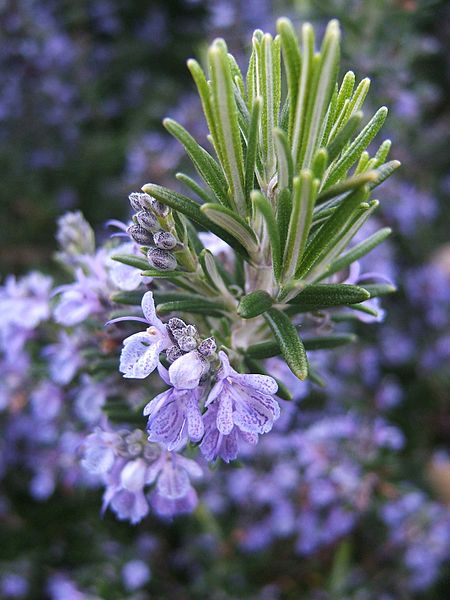- News and Information from Grove of the Ancient Oaks in Idaho's beautiful Treasure Valley.
Wednesday, May 8, 2013
Herbalism - Rosemary
"There's rosemary, that's for remembrance; pray, love, remember: and there is pansies. that's for thoughts." - Ophelia, Hamlet, Act 4, Scene 5.
Rosemary is one of the most well-loved and frequently-used herbs in the western world. It is frequently used in cooking, herbal medicine, beauty regimes, and magic. Rosemary is a woody perennial herb native to the Mediterranean region. Its name comes from the latin words ros (dew) and marinus (sea), thus its literal name is "dew of the sea," possibly because it needs nothing other than the spray and dew from the ocean to live. Its purple flowers are adored by bees, and its association with memory and the brain goes back many centuries.
According to Greek mythology, Aphrodite emerged from the sea draped in rosemary. There is also a legend that the Virgin Mary draped her blue cloak over a white-blooming rosemary bush, turning its blossoms their current blue/purple color.
Rosemary is great for cooking. One of my favorite uses in cooking is to cut up potatoes into bite size cubes or steak fries then toss them in olive oil, salt and pepper, minced garlic, and chopped rosemary leaves. I then spread them on a baking sheet or in a roasting pan and bake for about half an hour at 350 degrees, turning once or twice. Rosemary is high in antioxidants and has been shown to slow spoilage of omega-3 oils. It is a wonderful flavoring for meats and can be used in grilling.
A popular cure for gout and paralysis as early as the 14th century was to steep fresh rosemary tips in brandy. This was known as Hungary Water, named for the Hungarian Queen Elizabeth of Poland.
Rosemary has often been associated with memory, hence its traditional planting at the gates of cemeteries. Studies have shown that the scent of rosemary in an office setting did help improve memory performance among employees.
Rosemary is a symbol of love and remembrance. In the middle ages at weddings brides would wear a headpiece of rosemary, and the groom and guests would wear sprigs of it. Couples would plant a rosemary branch on their wedding day, and if it took root it was said to be a sign of a long and happy marriage. Rosemary has been used to divine potential lovers or attract new love. It is said that rosemary under the pillow will repel nightmares.
Rosemary grows well from cuttings. Simply cut a branch at a diagonal where it attaches to the main plant. Strip off the lower leaves, dip the cut end in honey (which acts as a disinfectant) and place in a vase of water until roots begin to grow. Make sure no leaves are below the water line, as they can attract mold and algae.
Rosemary is also known to promote hair growth. One study showed that participants who massaged their scalps with rosemary oil daily for 7 months experienced significant regrowth of lost hair due to alopecia. A massage with rosemary oil is also said to help joint and muscle pain.
Sources:
http://en.wikipedia.org/wiki/Rosemary
http://www.umm.edu/altmed/articles/rosemary-000271.htm
http://gardening.about.com/od/vegetablepatch/a/Rosemary.htm
Labels:
green witch,
herbs,
kitchen witch,
recipes
Subscribe to:
Post Comments (Atom)


I love this! This was such a cool idea. It was so interesting hearing about the history of the plant and its uses. The quote from Hamlet was cool touch.
ReplyDeleteThanks! I am a bit of a Shakespeare nerd. :)
ReplyDelete